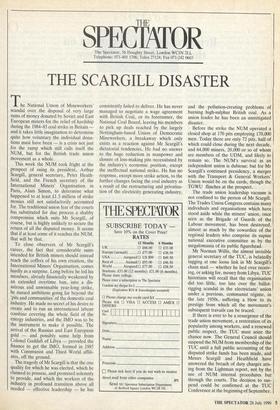SPECT THE AT OR The Spectator, 56 Doughty Street, London WC1N 2LL
Telephone: 071-405 1706; Telex 27124; Fax 071-242 0603
THE SCARGILL DISASTER
scandal over the disposal of very large sums of money donated by Soviet and East European miners for the relief of hardship during the 1984-85 coal strike in Britain and it takes little imagination to determine
quite how voluntary the individual dona- tions must have been — is a crisis not just for the rump which still calls itself the NUM, but for the British trade union movement as a whole.
This week the NUM took fright at the prospect of suing its president, Arthur Scargill, general secretary, Peter Heath- field, and the French secretary of the International Miners' Organisation in Paris, Alain Simon, to determine what happened to at least £1.5 million of strike monies still not satisfactorily accounted for. The traditional union fear of the courts has substituted for due process a shabby compromise which suits Mr Scargill, of course, but is highly unlikely to secure the return of all the disputed money. It seems that if at least some of it reaches the NUM, that will be that.
To close observers of Mr Scargill's career, the fact that considerable sums intended for British miners should instead reach the coffers of his own creation, the International Miners' Organisation, comes hardly as a surprise. Long before he led his members, already financially weakened by an extended overtime ban, into a dis- astrous and unwinnable year-long strike, he nursed ambitions going far beyond the `pits and communities' of the domestic coal industry. He made no secret of his desire to create and to run an international labour combine covering the whole field of the energy industries, and the IMO was to be the instrument to make it possible. The arrival of the Russian and East European gold — and possibly some help from Colonel Gaddafi of Libya — provided the finance to get the IMO, formed in 1985 with Communist and Third World affili- ates, off the ground.
The tragedy of Mr Scargill is that the one quality for which he was elected, which he claimed to possess, and promised solemnly to provide, and which the workers of the Industry in profound transition above all needed — effective leadership — he has consistently failed to deliver. He has never managed to negotiate a wage agreement with British Coal, or its forerunner, the National Coal Board, leaving his members to pick up deals reached by the largely Nottingham-based Union of Democratic Mineworkers, a breakaway which only exists as a reaction against Mr Scargill's dictatorial tendencies.. He had no answer to the huge reduction in manpower and closure of loss-making pits necessitated by the industry's economic position, except the ineffectual national strike. He has no response, except more strike action, to the further changes facing the coal industry as a result of the restructuring and privatisa- tion of the electricity generating industry, and the pollution-creating problems of burning high-sulphur British coal. As a union leader he has been an unmitigated disaster.
Before the strike the NUM operated a closed shop at 170 pits employing 170,000 men. Today there are only 72 pits, half of which could close during the next decade, and 64,000 miners, 20,000 or so of whom are members of the UDM, and likely to remain so. The NUM's survival as an independent union is dubious: but for Mr Scargill's continued presidency, a merger with the Transport & General Workers' Union would be on the cards, though the TGWU flinches at the prospect.
The trade union leadership vacuum is not confined to the person of Mr Scargill. The Trades Union Congress contains many individuals and organisations which have stood aside while the miners' union, once seen as the Brigade of Guards of the Labour movement, has been destroyed, almost as much by the cowardice of the regional leaders Who comprise its supine national executive committee as by the megalomania of its public figurehead.
Mr Norman Willis, the almost invisible general secretary of the TUC, is belatedly tugging at one loose link in Mr Scargill's chain mail — whether he lied over receiv- ing, or asking for, money from Libya. TUC historians will recall that the organisation did too little, too late over the ballot- rigging scandal in the electricians' union under a previous, communist regime, in the late 1950s, suffering a blow to. its prestige from which all the movement's
subsequent travails can be traced. .
If there is ever to be a resurgence of the trade union movement, a restoration of its popularity among workers, and a renewed public respect, the TUC must seize the chance now. The General Council should suspend the NUM from membership of the TUC until a full public accounting of the disputed strike funds has been made, and Messrs Scargill and Heathfield have answered the breach of duty charges aris- ing from the Lightman report, not by the use of NUM internal procedures but through the courts. The decision to sus- pend could be confirmed at the TUC Conference at the beginning of September.


















































 Previous page
Previous page